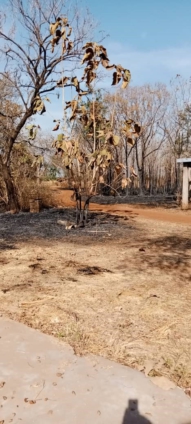Wildfires have destroyed several hectares of food crops while houses and farmlands are under threat in many rural farming communities in the North-East Region.
Food crops like rice, beans, soya beans and maize have been burnt beyond salvage at a time farmers are harvesting and others threshing.
Some farmers at Gbilugu, a farming community near Walewale in the West Mamprusi Municipality, and the Gbiligu Ecological Farm, have lost almost all produce to this year’s fires.
Beehives and a teak plantation at the Ecological Farm have not been spared either.
Some of the affected farmers said the harmattan, which was one of the driving forces of the wildfires, had started early as compared to previous years, making the grass dry and easily ignitable, thus the fast spread of fire.
Although the cause of the fire was unknown, most of the bushfires recorded in the area over the years had been caused by herdsmen, weed smokers and uncontrolled fires by some farmers.
Mr Tahiru Tia Mohammed, a farmer at the Gbilugu Ecological Farms, told the Ghana News Agency that many farmers were devastated as they lost their farm produce to wildfires in mid-November.
He said he had lost about 2.9 hectares of rice, 0.6 hectares of soyabeans, 0.4 hectares of maize, and 0.2 hectares of beans while a friend of his lost about 2.5 hectares of rice.
Mr Mohammed said though they created fire belts around the farms, that did not help much due to the harmattan winds.
“It is going to be very challenging because we depend solely on the farm. It is only some of the maize that we have been able to harvest but we have not even started harvesting the rice and the fire has burnt everything....”
Alidu Adams, another farmer, said he had lost all his 3.3 hectares of rice to the wildfire and that the situation, coupled with the current economic crisis would be dire, while Ibrahim Torisariye, said he lost about 2.9 hectares of rice.
According to the farmers, previously, wildfires were recorded towards the end of December and January when farmers had harvested their crops, but due to climate change, which had affected the rainfall pattern, the rains stopped too early and the grass dried up, making the area easily susceptible to fire.
Subordinate Officer, Abdul-Mumin Azabu, the West Mamprusi Municipal Public Relations Officer of the GNFS, noted that wildfires had been one of the major challenges affecting farming communities in the area over the years, destroying food crops and houses.
He stated that three bushfires were recorded in November 2021 while two had been recorded so far in November, 2022.
He said due to financial and logistical constraints the Service had not been able to reach out to many communities to educate them on fire prevention and appealed for retooling of the Service to perform its functions well.
Latest Stories
-
Karim Zito qualified to be Black Stars head coach – Mohammed Polo
3 mins -
Platinum Cup makes return on April 27
9 mins -
MoE is not changing uniforms or re-painting all public schools – Kwasi Kwarteng clarifies
42 mins -
16th Africa Aquatics Swimming Championships: Nubia and Harry to represent Ghana in Angola
49 mins -
Four defendants in NDA case by OSP open defence today
50 mins -
GFA commissions first set of floodlights at Ghanaman Soccer Centre of Excellence
55 mins -
Basic public school uniform change an initiative, not a policy – Kwasi Kwarteng
58 mins -
Bawumia appeals for peace in Gonjaland, donates GHȼ100K, bull
1 hour -
Drake: AI Tupac track gone from rapper’s Instagram after legal row
1 hour -
Repainting schools, changing uniforms a misplaced priority – Joy FM listeners on rebranding of basic public schools
1 hour -
UEFA U-16 Tournament: Black Starlets bounce back with 5-1 win over Serbia
2 hours -
There’s nothing strange about changing colours for basic public schools – Education Ministry PRO
2 hours -
Diana Asamoah causes arrest of personal assistant over GH₵4k MoMo theft
2 hours -
Adina impresses fans with new single ‘Emergency’
2 hours -
Our mindset should breed excellence – Ace Ankomah
2 hours

